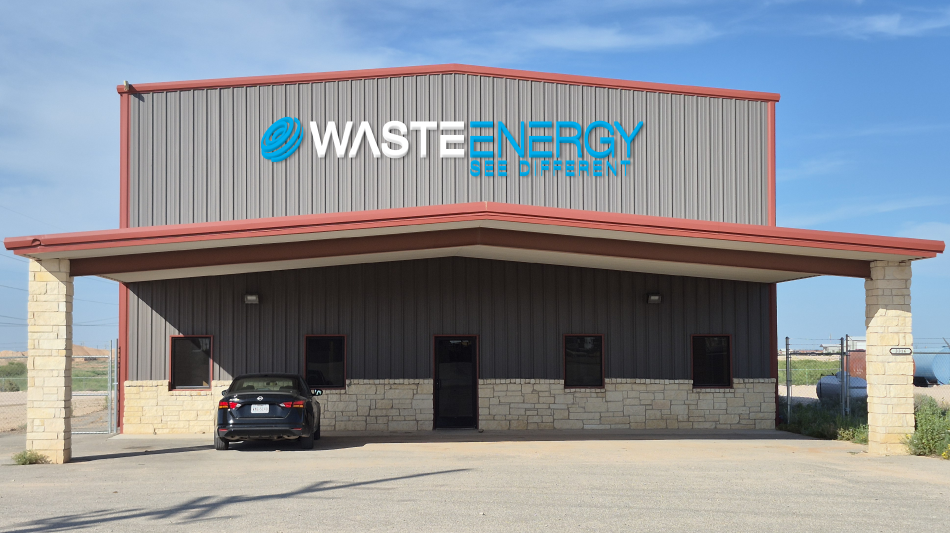Transforming plastic and tires into clean energy—sustainable solutions, powered by Waste Conversion Technology.
What we do?
We transform waste into clean energy with our proprietary waste conversion technology—building a cleaner, more sustainable world for future generations.

Our Business
Waste Energy Corp is a clean energy company with a singular mission: to turn the world’s most stubborn waste streams—tires and plastics—into valuable resources. Using our proprietary waste conversion technology, we transform discarded materials into ultra-low-sulfur fuels, carbon credits, and reusable byproducts. By aligning profitability with sustainability, we’re building a business model that reduces pollution, conserves landfill space, and delivers measurable returns for investors and communities alike.
Our Midland Site
Our first U.S. facility, located in Midland, Texas, marks the beginning of this transformation at scale. Built to process up to 15 tons of waste per day, our Midland site will showcase the efficiency and scalability of our technology. By combining advanced conversion systems with rigorous environmental controls, we are setting a new standard for responsible energy production. Midland’s strategic location, access to energy markets, and strong industrial infrastructure make it the perfect launching point for our national expansion.
Blockchain Carbon Credit Automation
In addition to clean fuels and byproducts, Waste Energy Corp is pioneering a patent-pending blockchain platform that automates the measurement, verification, and issuance of carbon credits. By integrating real-time data from our conversion systems into a secure, transparent blockchain ledger, we create carbon credits that are instantly verifiable and tradable. This innovation ensures integrity in reporting, streamlines the crediting process, and opens a new revenue channel that directly links environmental performance with investor value.
Our Environmental Impact
Every tire and plastic bottle we divert from landfills represents a cleaner future. By reducing the volume of waste that would otherwise sit for centuries—or burn in polluting fires—we are cutting emissions, reclaiming valuable resources, and helping communities address one of the fastest-growing global challenges. Waste Energy Corp is more than a technology company; we are a partner in building a world where economic growth and environmental responsibility go hand in hand.
Environmental Impact
- Sustainability and Resource Optimization: Greentech aims to reduce environmental impact by using renewable resources and optimizing energy use. AI can enhance these efforts by analyzing large datasets to find efficiencies and predict environmental outcomes. Blockchain provides transparency and accountability, ensuring sustainable practices are traceable and verifiable.
- Reduction in Waste and Pollution: AI can help optimize waste management and recycling processes. Greentech benefits from these insights, allowing businesses to minimize waste, reduce pollution, and promote a circular economy.
Economic Value
- New Business Models and Revenue Streams: The integration of AI, and Greentech opens new business opportunities. AI-driven analytics can identify market trends and opportunities for sustainable products. Web3's secure transactions and smart contracts facilitate new business models, such as decentralized energy trading or carbon credits, while Greentech creates eco-friendly products and services.
- Efficiency and Cost Reduction: AI can streamline processes, automate tasks, and reduce operational costs. Greentech offers energy-efficient solutions, further reducing operational costs.
Technological Innovation
- Cross-Disciplinary Synergy: The convergence of these technologies fosters innovation across multiple domains. AI can enhance Greentech's effectiveness through predictive analytics, while Blockchain's transparency and security enable new applications in energy management, waste reduction, and supply chain tracking.
- Waste Conversion Technology (WCT): WCT is a thermal decomposition process where organic materials, such as biomass or plastic, are heated in the absence of oxygen. This results in the breakdown of the material into smaller molecules, producing gases, liquids (such as bio-oil), and char. WCT offers a method for converting waste into valuable products, including biofuels and chemicals.
Social Impact
- Transparency and Accountability: Blockchain's decentralized ledger ensures that transactions are transparent and accountable, which is crucial for sustainability initiatives. This transparency builds trust among stakeholders and encourages responsible business practices.
- Empowerment and Inclusion: AI can identify opportunities for social impact, such as providing access to clean energy in underserved regions. Blockchain enables decentralized applications that empower individuals and communities, while Waste Conversion Technology offers solutions that promote sustainability and well-being.
Contribution to Global Goals
- Support for Sustainable Development Goals (SDGs): The combination of AI, and Waste Conversion Technology aligns with several UN SDGs, including affordable and clean energy, industry innovation, and responsible consumption and production. This alignment demonstrates a commitment to broader global objectives.
- Climate Action and Resilience: AI's predictive capabilities and Waste Conversion Technology's sustainability contribute to climate action and resilience. These technologies can help businesses and communities adapt to climate challenges and reduce their carbon footprint.
In summary, the combined value of finding solutions that utilize AI and Waste Conversion Technology lies in their potential to drive sustainability, foster economic growth, encourage technological innovation, and contribute to broader social and environmental goals. The synergy among these technologies creates a powerful platform for addressing complex challenges and building a more sustainable and equitable future.



